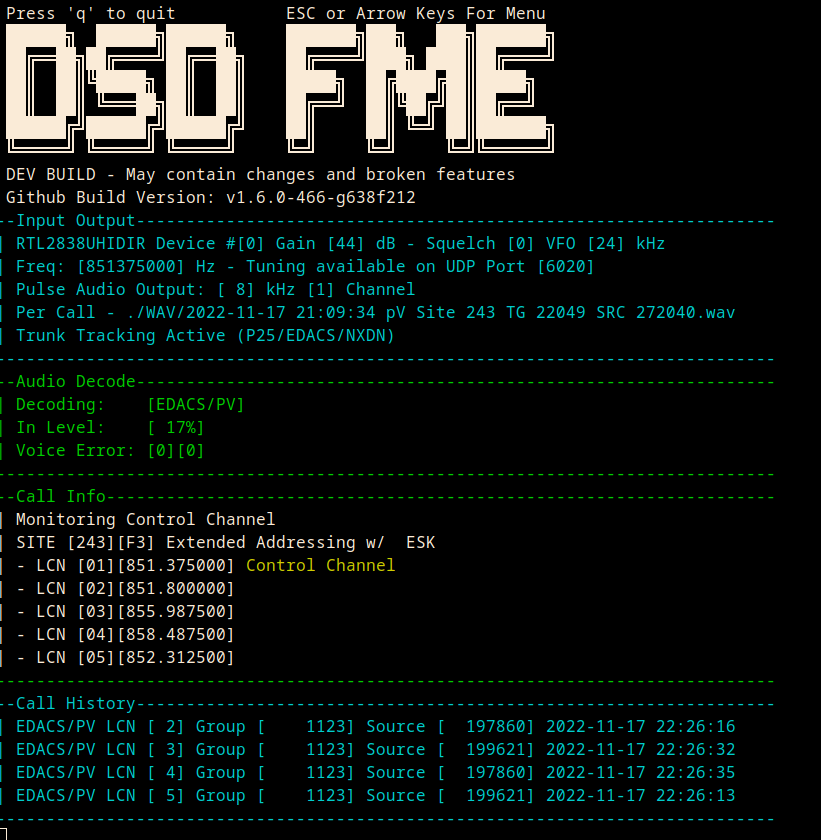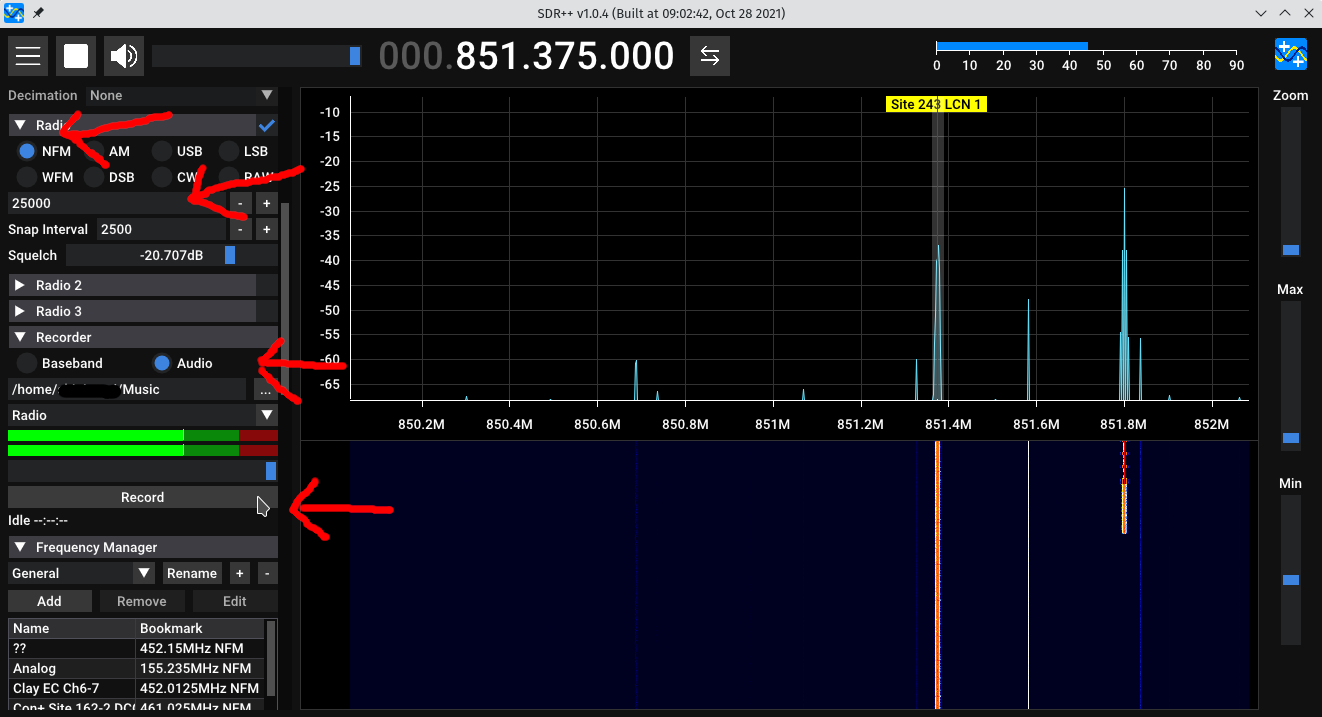EDACS-FM has been ported into DSD-FME and its trunk tracking capability and digital voice handling can now be used in DSD-FME very similary to how EDACS-FM handled. DSD-FME can also use an rtl dongle directly, or make use of SDR++ TCP linked audio (opening up a lot more devices to be used) with RIGCTL to directly control and tune the VFO and achieve EDACS trunking that way. The only cavaet of the DSD-FME method is that there is single dongle only (honestly probably just as well this way) and there is no handling currently for analog audio. For purely digital/provoice systems, I highly recommend any users of EDACS-FM to checkout DSD-FME in the dev branch, EDACS and EDACS-EA trunking is currently working and the layout will be very similar to anybody using EDACS-FM. This project will be archived with no more updates.
https://github.com/lwvmobile/dsd-fme
EDACS 9600 Trunk Tracking software for Linux, *Nix, BSD systems, Cygwin (and maybe others) using two RTL2838 dongles for decoding and tuning or decoding with SDR++ and GQRX UDP Sink sources.
https://www.youtube.com/watch?v=jCS7RBdyDZg
Continuation of the LEDACS-ESK project, originally forked from LEDACS, appropriate links below:
https://github.com/lwvmobile/ledacs-esk
https://github.com/sp5wwp/ledacs
Make sure to have the prerequisite dependencies (or equivalents) installed:
sox aplay cmake build-essential socat libusb-1.0-0-dev libncurses5 libncurses5-dev gnuradio rtl-sdr libusb-1.0-0-dev
If using Debian/Ubuntu base, you can use
sudo apt update
sudo apt install git sox cmake build-essential socat libusb-1.0-0-dev libncurses5 libncurses5-dev gnuradio gr-osmosdr rtl-sdr libusb-1.0-0-dev
chmod +x build.sh
./build.sh
If any build errors occur, double check all dependencies are met, and feel free to raise issue on github if build errors persist.
When complete, you can populate your group.csv and site.csv with frequencies and groups. site.csv will need proper site number in decimal with matching frequencies in Hz in order to tune properly. group.csv is purely optional, but provides a way to give groups proper names and also set modes such as DE - Digital Encrypted, A - Allow, D - Digital, and B - Block. Example lines already provided in site.csv and group.csv files. Populating group.csv is highly recommended on highly busy systems to very selectively choose who to listen to.
Choose whether you wish to run software with rtl_fm or gnuradio. gnuradio has added benefit of being able to select site, set gain, and hunt for control channel from LCNs in the site.csv file. Most users are recommended to use the gnuradio/PyEdacs solution provided. Advanced users may also wish to tinker with the provided gr files to fine tune the radio to their desired usage, or select a device type other than rtl dongles. Only support for rtl dongles is provided on the github, but other sources should be compatible, given a little advanced user tweaking to the python code.
rtl_fm provides two modes of use, two dongle mode, where one dongle dwells on the control channel, and the second dongle tunes directly to the LCN, or single mode, where one dongle is used to tune both the control channel and switch to the voice channel LCN when a voice call is granted. Users are recommended to use this solution.
The included example scripts contain interactive setup which will ask you for all the necesary information to run EDACS-FM.
You can start either
./start-control-rtlfm.sh and ./start-lcn-rtludp.sh
in two seperate terminals for two start-sdrpp-gqrx-udp-signal.shdongle mode
or
./start-single-dongle-rtludp.sh to run in single dongle mode. I only currently advise using Single Dongle Mode for purely digital systems for now.
If you wish to only decode EDACS systems, and not tune, then using ./start-control-rtlfm.sh will be the best solution.
An alternate solution for EDACS-FM decoding is to use start-sdrpp-gqrx-udp-signal.sh which will take signal input from SDR++ or GQRX UDP port 7355 and decode the signal. Make sure to enable/start the UDP sink feature in either program prior to starting this script. This is very useful for discovering EDACS systems in your area, and can still be used with ./start-lcn-rtludp.sh to tune the second dongle if desired.
Optional 'Virtual Sinks' for routing audio from EDACS-FM, etc, into DSD-FME or similar.
You may wish to direct sound into DSD-FME, or similar, via Virtual Sinks. You may set up a Virtual Sink or two on your machine for routing audio in and out of applications to other applications using the following command, and opening up pavucontrol "PulseAudio Volume Control" in the menu to change line out of application to virtual sink, and line in of DSD-FME to monitor of virtual sink. This command will not persist past a reboot, so you will need to invoke them each time you reboot, or search for how to add this to your conf files for persistency if desired.
pacmd load-module module-null-sink sink_name=virtual_sink sink_properties=device.description=Virtual_Sink
pacmd load-module module-null-sink sink_name=virtual_sink2 sink_properties=device.description=Virtual_Sink2
With two dongle monitoring, DSD-FME RTL input mode can be substituted for ./start-lcn-rtludp.sh on purely digital systems, and also experimentally with mixed analog and digital systems. DSD-FME has the same built in UDP remote features that rtl_udp uses, so it works extremely well when paired together. See more inormation at the link. Running with -W for source monitor input will allow for monitoring mixed analog and digital EDACS systems using the following command for LCN monitoring. The source audio monitor built in is still considered experimental, and monitored audio speed of analog systems may be slower (approx. 83%) when using rtl input into DSD-FME.
padsp -m DSDFME -- ./dsd -fp -i rtl -o /dev/dsp -c 850M -P -2 -D 1 -G 36 -U 6020 -Y 24 -W
You can also run two dongle mode (LCH channel with rtl_udp) , and run line in into DSD-FME with the -W switch on DSD-FME to get analog audio monitoring and ProVoice decoding in real time at full speed.
padsp -m DSDFME -- ./dsd -fp -i pa:1 -o /dev/dsp -W
WAV recordings of EDACS 9600 control channels are always nice to have. Currently, I am in need of EDACS Narrowband systems, and any other exotic variants. Feel like your EDACS system isn't working correctly? Then submit the WAV file! Please don't submit more than 3 to 5 minute recordings, WAV sample sizes can become very large. WAV Samples MUST be 48000Hz 16-bit mono. No Wonky SDR# recording please.
Also, please no baseband recordings unless you discuss it with me first.
WAV files of Control Channels can be acquired using SDR++ .
Be sure to set your VFO to 25khz NFM, set the VFO on the control channel and select Audio under Recorder. Make sure to keep the audio in the green and not in the red under recording, turn the gain down if necessary. Thanks.
I don't recommend sending GQRX or SDR# samples right now, I tested a few of my own creation, and found they may have issues that prevent them from working properly. I highly recommend SDR++ for sample creation (and general use).
Samples can be uploaded to https://ufile.io/ free of charge without making a membership. File links can be sent to me under issues, I will have a rolling issue for control channel samples.
Thanks for your help.
Cygwin has limited support by me as far as I can test things on my own personal set up, but currently it can be built in Cygwin with the right prerequisites installed. Check the cygwin-build.sh file for the necessary packages to install in Cygwin prior to building. The build scripts will be prefixed with cygwin and the start up scripts suffixed with cygwin for clarity to denote the correct scripts to use for Cygwin builds.


